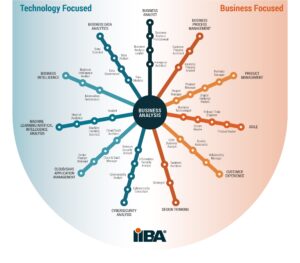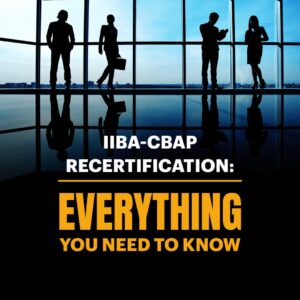The Business Analysis profession is one of the most popular career choices in the business world. It is an exciting profession that encompasses many different activities – some of which may be seen as complex and challenging, but ultimately it is highly rewarding. In fact, some of the perks of being a business analyst include a high amount in salaries, plentiful job opportunities, and extreme job satisfaction and work-life balance.
Depending on the organization, the business analyst role can be an entry-level position or a role for experienced professionals. However the case may be, it is a role that requires an individual to contribute expertly to the organization’s strategy, revenue, and margin.
A Business Analyst work as a bridge between business stakeholders and technology architects. They focus on process and systems improvement, solving business problems, performance analysis, competitor analysis, and focusing on business development.
Indeed, the Business Analyst role is one of the most dynamic roles in an organization or business environment. You don’t have to worry about being bored in this practice because it provides an opportunity for life-long learning and addressing challenges to provide solutions to business problems.
This is just the elevator pitch on business analysis. If you are looking to start a career in business analysis, or make a career transition into this profession, you’ll need to gain a better understanding of what it actually means to be a business analyst.
In this article, we would take a closer look at Business Analysis, and the steps involved when making a career switch to this highly-rewarding profession.
Starting from the basics, What is Business Analysis?
A textbook definition of Business Analysis is, it is the practice of enabling change in an organizational context, by defining needs and recommending solutions that deliver value to stakeholders.
John Ojurabesa, in his article on Business Analysis: The Proverbial Elephant (Part II), defines business analysis as “A disciplined approach for covering needs at different levels from enterprises, to understanding stakeholder context for the sole purpose of enabling change. Change that delivers value and brings a solution to whatever the context is.”
One thing to take away from this is that business analysis is a practice that enables change, and also delivers baseline benefits to the business.
Interestingly, business analysis is actually a broad spectrum that cuts across different fields. There can be business analysts from healthcare to finance to “tech”, etc. This means that functioning as a business analyst is not limited to a certain industry or sector. Yes, you can be a data analyst, but you’re also using some form of business analysis competencies to deliver data insights and data analytics outcomes.
The same thing applies to other industries like the tech space, whether it is infrastructure, Project management, or implementation. Business analysis is a focus that uses skills from many other disciplines, so professionals can use their experiences from previous roles to perform better as analysts.
From the foregoing, we can therefore say that irrespective of domain, your claim to a business analyst career is not necessarily determined by your job title, but by the ‘business analyst’ related tasks you perform for your company.
Below, we have a detailed illustration from IIBA, of what the business analyst career path encompasses, and the continuing evolution of business analysis.

What this shows is there are countless opportunities for business analysts in different industries. They have a very important role to play in all of these career sectors.
Having already discussed what the Business Analysis practice is all about, let us now look at those crucial steps you should take to transition from your present position to that of a Business Analyst.
1. Be Intentional
It is not enough to just say you want to become a business analyst without necessarily having a precise objective and timetable in mind for accomplishing your aim. You need to be intentional by having a goal in mind and taking actionable steps to realize that goal. Have a clear vision of the ultimate objective of where you are now in the function of a business analyst, establish a deadline for accomplishing this aim, then devise a strategy to plan out how you want to achieve this.
2. Business Analysis Training
The next step for you is educating yourself about business analysis and getting to know what it takes to be a business analyst. This is a very important phase in transitioning because irrespective of your professional experience, you need to have a better understanding of what it takes to be a Business Analyst. You need to know about the latest technologies used in business analysis, how and why they are used, what their benefits are, and how they are changing the management strategies.
A Curated course like the BNET Learning Business Analysis Hands-On training is ideal if you’re looking to build credible knowledge in business analysis. With this course, you are able to learn all about the best practices in this professional domain, and also gain practical business analysis skills to be able to function as a market-ready business analyst.
3. Get Certified in Business Analysis
Obtaining a certification in business analysis can be critical to your career success as a professional looking to transition into this field. Firstly, to validate your business analysis experience either for personal or professional recognition, and secondly, your journey to earn certification by attending boot camps and trainings, helps you build a solid knowledge base
The certifications are stratified depending on where you are in your career. There is the ECBA which is the entry-level into business analysis. It is tailored for those who are new to business analysis, or have no prior BA experience but want to show interest in business analysis to potential employers.
There is also the CCBA, which is the Certificate of Competencies in Business Analysis. This certification is targeted at people who have little, but not up to five years of experience in business analysis or related domains.
Then there is the CBAP which is the Certificate in Business Analysis Professional. This certification talks to the managerial level of business analysis. Here, you are required to have at least five years of experience in business analysis and related domains.
4. Develop Analytical Skills
One very important key to being a business analyst is one’s ability to learn quickly and build certain analytical skills that are considered necessary for this job role. Proficiency in excel and possibly learning BI software is an add-on to your business analysis portfolio.
Also, because business analysts are usually detail-oriented and problem solvers, you need to be a critical thinker with excellent communication and presentation skills in order to be successful in this profession. Once you possess the above skills with the proper training, you can apply for suitable BA jobs.
5. Get Mentorship
As a new or aspiring Business Analysis practitioner, seeking out mentorship from experienced professionals is a sure way to stay afloat when you have been metaphorically thrown into the deep end of the business analysis pool.
Getting some form of mentorship where you can be advised based on your current trajectory, so you can know your next steps is key to establishing yourself as a business analysis professional.
BNET learning is an institution that is not only focused on training but also offers mentoring services where we sit shoulder-to-shoulder with you to intentionally nurture you and aid your development as a business analyst.
In conclusion, Business Analysis as a profession is very lucrative, and it is one that would guarantee job satisfaction. Most middle and large companies across all industries, including finance, consulting, and tech offer full-time business analyst positions. Additionally, certification as a business analyst helps to validate your competency and increase your overall earning power.
According to IIBA’s 2021 Global State of Business Analysis report, Business Analysis professionals who hold one or more IIBA Certifications, earn 12% higher than non-certified respondents. Also from this report, it is said that Business Analysis professionals who hold the CBAP Certification earn 26% more than non-certified professionals.
If you are looking to start a career in this field as a Certified Business Analysis Professional, I can assure you that a fulfilling and highly-rewarding career awaits you.
Visit the course page on our website today to enroll for any of our Business Analysis Certification Bootcamp or our Curated Business Analysis Hands-On Training.
If you are in need of assistance or wish to talk to our program advisor, you can either call us at +1 4034379115 | +234-807-4429193 or send an email to info@bnetlearning.com





